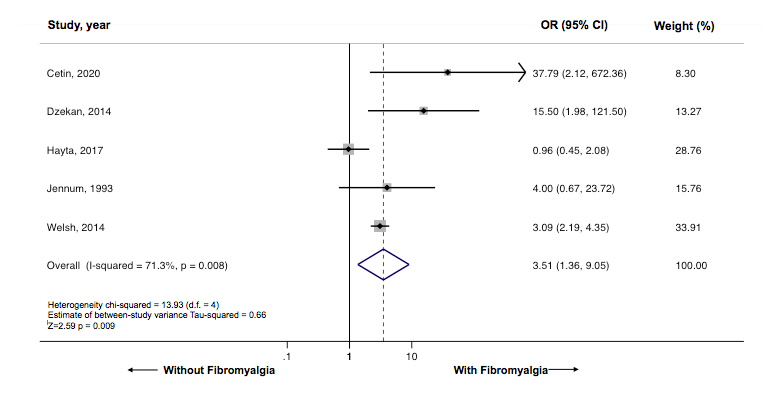Session Information
Session Type: Abstract Session
Session Time: 10:00AM-10:50AM
Background/Purpose: Fibromyalgia is a chronic pain disorder prevalent in about 3% of the population, mostly in females. A common complaint is non-restorative sleep. Obstructive sleep apnea (OSA), the most common sleep related breathing disorder, has an estimated prevalence of 10-15% in females. It is characterized by upper airway collapse during sleep leading to apnea and hypopnea with poor fragmented sleep. Several studies have reported a positive correlation between chronic pain syndromes and sleep disorders. The link between OSA and pain syndromes is still unknown. It has been hypothesized that hyperalgesia occurs because of fragmented sleep and hypoxemia that enhance sensitivity to pain, promote inflammation, and increase spontaneous pain. Our study aimed to determine the incidence and prevalence of OSA in FM patients.
Methods: We comprehensively searched the databases of MEDLINE, EMBASE, and Cochrane from inception to May 2020. Included studies were published observational studies (cohort or case-control) that investigated the incidence of OSA comparing patients with and without FM. We also included studies that reported the prevalence of OSA in FM. Data from each study were combined using the random-effects, generic inverse variance method of DerSimonian and Laird to calculate odd ratio and 95% confidence intervals.
Results: Fifteen studies from 1989 to 2020 were included in this meta-analysis involved ten studies reported prevalence and five case-control studies reported the incidence of OSA in FM patients. Pooled prevalence of OSA was 38.5 per 100 FM patients [95% confidence interval (CI): 24.4-52.6]. Incidence of OSA was significantly higher in patients with FM compared to without FM (pooled odd ratio = 3.51, 95% CI: 1.36-9.05, p = 0.008, I2=71.3%) (Figure1). There was no publication bias observed in Funnel plot as well as no small-study effect observed in Egger’s test (p-value = 0.921)
Conclusion: Our study demonstrated that there was a higher incidence and prevalence of OSA among FM patients. Polysomnography should be a standard diagnostic tool in the assessment of FM to unmask underlying treatable conditions that may contribute to the symptoms. As yet, there is no evidence that the treatment of OSA would lead to amelioration of chronic pain in FM. Further studies are needed to examine whether the treatment of the commonly detected OSA will have a beneficial effect on fibromyalgia symptoms.
 Figure 1: Forest plot demonstrating the association between Fibromyalgia and the Incidence of Obstructive Sleep Apnea
Figure 1: Forest plot demonstrating the association between Fibromyalgia and the Incidence of Obstructive Sleep Apnea
To cite this abstract in AMA style:
Eshak N, Vutthikraivit W, Beltagy A, Pixley J. Obstructive Sleep Apnea in Fibromyalgia Patients: A Meta-analysis [abstract]. Arthritis Rheumatol. 2020; 72 (suppl 10). https://acrabstracts.org/abstract/obstructive-sleep-apnea-in-fibromyalgia-patients-a-meta-analysis/. Accessed .« Back to ACR Convergence 2020
ACR Meeting Abstracts - https://acrabstracts.org/abstract/obstructive-sleep-apnea-in-fibromyalgia-patients-a-meta-analysis/
